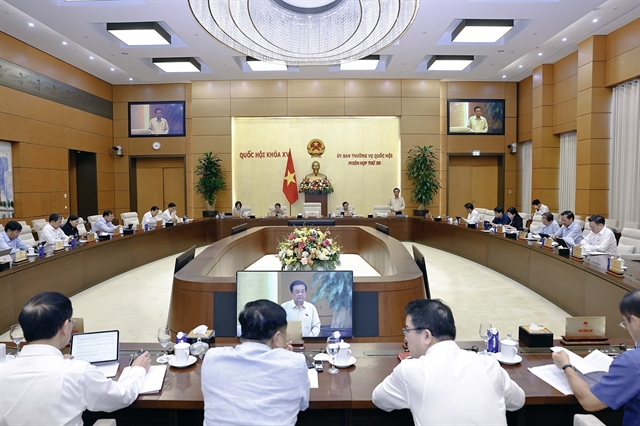 Politics & Law
Politics & Law


|
| At the session. VNA/VNS Photo |
HÀ NỘI — The National Assembly Standing Committee, at its 50th session on October 16, discussed the draft Law on Digital Transformation, which aims to fill existing legal loopholes and create a comprehensive framework for the country’s digital progress.
Presenting the key contents of the draft, Permanent Deputy Minister of Science and Technology Vũ Hải Quân said that the Party and State’s policies on digital transformation have been consistently defined and clearly reflected in their top-level directives.
The new law, he noted, is designed to improve the legal system, establish a cross-sectoral framework, regulate relations between stakeholders in the digital environment, promote comprehensive digital transformation, and strengthen international cooperation and integration.
According to Deputy Minister Quân, the draft law consists of eight chapters with 79 articles, covering digital infrastructure, digital government, the digital economy, the digital society and measures to ensure smooth and secure digital transformation.
“This is a framework law that builds upon existing legal provisions on information technology, connects current laws and fills legal gaps to form a consistent and comprehensive corridor to guide and promote national digital transformation,” Quân said.
Deputy Head of the NA Committee on Science, Technology and Environment Nguyễn Phương Tuấn said the committee agreed on the need to enact the law and supported the Government’s proposals. The draft dossier, submitted under a shortened procedure, meets the conditions for the Standing Committee to consider before submission to the 10th NA session.
However, the drafting agency was urged to further review and align the draft with related laws such as those on investment, bidding and the State budget. It should also coordinate closely with agencies drafting other laws to be discussed at the 10th NA session, including the amended Law on E-Commerce, the revised Law on High Technology, amendments to the Law on Intellectual Property, and the Cybersecurity Law, to ensure consistency across the legal system.
The draft should also clearly define the Law on Digital Transformation’s position and relationship with other relevant laws, such as the Law on E-Transactions, the Law on Identification, the Law on Data, Resolution No. 193/2025/QH15, the Law on Digital Industry and the Law on Personal Data Protection, to avoid overlap and duplication.
Since the Law on Investment is also being revised, Tuấn proposed reviewing any overlapping provisions to ensure coherence between the two laws.
Regarding the regulation that online public services should be designed and provided based on citizens’ life events and the business life cycle, the Committee on Science, Technology and Environment noted that administrative procedures already have defined processes and authorities that ensure equality before the law.
“The proposed wording could lead to inconsistencies and discretionary practices among different administrative agencies,” Tuấn said.
The committee also recommended clarifying the scope of the 'digital economy' in the draft, distinguishing it from other economic sectors using digital technologies and platforms already regulated by laws on commerce, e-commerce, consumer protection, banking and insurance.
It also called for closer alignment with the draft E-Commerce Law, particularly regarding platform management and the responsibilities of platform owners and users in the digital economy.
For the management of investment in digital products, procurement and services, the committee proposed adding special procurement mechanisms beyond those in the Bidding Law, such as direct contracting and commissioning, for complex, high-tech, proprietary or strategically important national projects.
It also suggested allowing more flexible payment mechanisms, including partial or full advance payments for technology leasing services such as cloud computing infrastructure and software platforms, to match international market practices.
NA Vice Chairwoman Nguyễn Thị Thanh said the draft law has inherited relevant provisions of the Law on Information Technology while incorporating new rules reflecting emerging technologies such as artificial intelligence, big data, the Internet of Things, blockchain and digital twins.
She noted that the drafting body has referred to international frameworks and laws from the EU, Japan and the Republic of Korea, helping the draft align with global standards and form a strong legal foundation to promote comprehensive digital transformation. The law, she added, places citizens and businesses at the centre, aiming toward a sustainable digital economy and society.
Concluding the discussion, NA Vice Chairman Lê Minh Hoan said the Standing Committee requested the Government to continue studying and refining the draft to institutionalise the Party Central Committee and Politburo’s policies and remove barriers that hinder progress in digital transformation.
He also stressed the need for a careful review of related regulations across the legal system to avoid duplication or contradictions that could increase compliance costs.
Vice Chairman Hoan assigned the Standing Committee of the NA Committee on Science, Technology and Environment to finalise the review report for submission to the 10th NA session.
Earlier the same morning, the Standing Committee discussed the draft amended Law on High Technology and proposed amendments to the Law on Public Debt Management. — VNS




